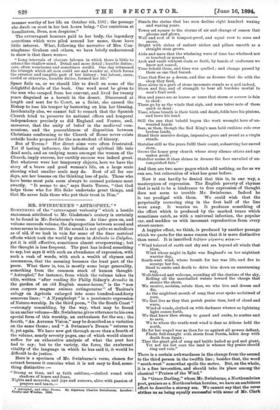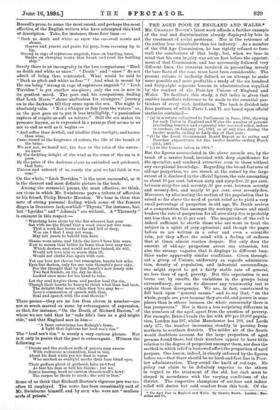MR. SWINBURNE'S " ASTROPHEL." *
SOMETHING of the " extravagant verbosity" which a hostile statesman attributed to Mr. Gladstone's oratory is certainly to be found in Mr. Swinburne's verse. As time goes on, and volume succeeds volume, the disproportion between sound and sense seems to increase. If the sound is not quite so melodious as of old, if we look in vain for some of the finer metrical effects which took the world by storm in A/a/anta in Calyclon, yet it is still effective, sometimes almost overpowering ; but the thought is less frequent. The poet has indeed something to say, but says it with such an abundance of expression, with such a rush of words, with such a wealth of rhymes and assonances, that the meaning becomes the least part of the poem. What there is, too, is mostly some large generality, something from the common stock of human thought. " Astrophel," for instance, from which the volume takes its title, written "after reading Sir Philip Sidney's Arcadia in the garden of an old English manor-house," is the "non cum corpore magnae animae extinguuntur " of Tacitus's eulogy on Agricola enlarged into some hundred-and-forty sonorous lines; "A Nympholept " is a passionate expression of Nature-worship. In the third poem, "On the South Coast" —strongly resembling, by the way, what may be found in an earlier volume—Mr. Swinburne gives utterance to his own special form of this worship, an enthusiasm for the sea ; the fourth, "An Autumn Vision," may be described as a variation on the same theme; and "A Swimmer's Dream" returns to it, yet again. We have now got through more than a fourth of the volume, nearly seventy pages, one of which would almost suffice for an exhaustive analysis of what the poet has had to say; but to the variety, the force, the exuberant vitality of the language in which he has said it, it would be difficult to do justice.
Here is a specimen of Mr. Swinburne's verse, chosen for extract because it contains what it is not easy to find, some- thing distinctive :—
" Strong as time, and as faith sublime,—clothed round with shadows of hopes and fears,
Nights and morrows, and joys and sorrows, alive with passion of prayers and tears,—
Astrophel, and Miter Poems. By Algernon Charles Swinburne. London: Matto sad Windom. 1894.
Stands the shrine that has seen decline eight hundred waxing and waning years.
Tower set square to the storms of air and change of season that glooms and glows, Wall and roof of it tempest-proof, and equal ever to suns and snows,
Bright with riches of radiant niches and pillars smooth as a straight stem grows.
Aisle and nave that the whelming wave of time has whelmed not or touched or neared, Arch and vault without stain or fault, by hands of craftsmen we know not reared, Time beheld them, and time was quelled ; and change passed by them as one that feared.
Time that flies as a dream, and dies as dreams that die with the sleep they feed, Here alone in a garb of stone incarnate stands as a god indeed, Stern and fair, and of strength to bear all burdens mortal to man's frail seed.
Men and years are as leaves or tears that storm or sorrow is fain to shed : These go by as the winds that sigh, and none takes note of them quick or dead : Time, whose breath is their birth and death, folds here his pinions, and bows his head.
Still the sun that beheld begun the work wrought here of un- wearied hands Sees, as then, though the Rod King's men held ruthless rule over lawless lands, Stand their massive design, impassive, pure and proud as a virgin stands.
Statelier still as the years fulfil their count, subserving her sacred state, Grows the hoary grey church whose story silence utters and age makes great : Statelier seems it than shines in dreams the face unveiled of un- vanquished fate."
And then are two more pages which add nothing, as far as we can see, but reiteration of what has gone before.
Now it can hardly be denied that this is, in one way, a, masterpiece of expression. The English poverty of rhymes that is said to be a hindrance to free expression of thought does not seem to trouble Mr. Swinburne. Indeed he is too prodigal with them. We could wish that the perpetually recurring ring in the first half of the line were away. It wearies us. It produces something of the effect which is produced by the marked tunes which sometimes catch, as with a universal infection, the popular ear, and madden us with incessant reproduction from every street-corner.
A happier effect, we think, is produced by another passage which we quote for the same reason that it is more distinctive than usual. It is inscribed ZeP6pov yiyarroc atipcf:—
" Wind beloved of earth and sky and sea beyond all winds that blow,
Wind whose might in fight was England's on her mightiest warrior day, South-west wind, whose breath for her was life, and fire to scourge her foe, Steel to smite and death to drive him down an unretnrning way, Well-beloved and welcome, sounding all the clarions of the sky, Rolling all the marshalled waters toward the charge that storms the shore, We receive, acclaim, salute thee, we who live and dream and die, As the mightiest mouth of song that ever spake acclaimed of yore. We that live as they that perish praise thee, lord of cloud and wave, Wind of winds, clothed on with darkness whence as lightning light comes forth, We that know thee strong to guard and smite, to scatter and to save, We to whom the south-west wind is dear as Athens held the north, He for her waged war as thou for us against all powers defiant, Fleets full-fraught with storm from Persia, laden deep with death from Spain : Thee the giant god of song and battle hailed as god and giant, Yet not his but ours the land is whence thy praise should ring and rain."
There is a certain awkwardness in the change from the second to the third person in the twelfth line; besides that, the word " south-west " somewhat spoils the metre. But, on the whole, it is a fine invocation, and should take its place among the classical "Praises of the Wind."
In "Grace Darling," whom Mr. Swinburne, a Northumbrian poet, praises as a Northumbrian heroine, we have an ambitions effort to describe a stormy sea. We cannot say that the verse strikes us as being equally successful with some of Mr. Clark Russell's prose, to name the most recent, and perhaps the most effective, of the English writers who have attempted this kind of description. Take, for instance, these font. lines :— "Dark as death and white as snow the sea-swell scowls and shines, Heaves and yearns and pants for prey, from ravening lip to EP. Strong in rage of rapturous anguish, lines on hurtling lines, Ranks on charging ranks, that break and rend the battling ship."
Surely there is an incongruity in the two comparisons "Dark as death and white as snow." "Death" and " snow " do not admit of being thus contrasted. What would be said to "Dark as pitch and white as fear " ? And what is meant by the sea being "strong in rage of rapturous anguish " ? "Loch Torridon" is yet another sea-piece ; only the sea is now in its gentlest mood. The poet and his companions, finding that Loch Maree "shone shelterless for strangers," journey on in the darkness till they come upon the sea. The night is absolutely calm. "Not a whisper or lisp from the waters," or, as the poet goes on to put it less intelligibly, "a passionless rapture of respite as soft as release." Still the sea makes its presence known, as is expressed in a passage that seems to us not to end as well as it begins :- ' And softer than dewfall, and kindlier than starlight, and keener than wine, Came round us the fragrance of waters, the life of the breath of the brine.
We saw not, we heard not, the face or the voice of the waters : we knew By the darkling delight of the wind as the sense of the sea in it grew, By the pulse of the darkness about us enkindled and quickened, that here, Unseen and unheard of us, surely the goal we had faith in was near."
On the whole, "Loch Torridon." is the most successful, as it is the clearest and most definite picture in the book.
Among the memorial poems, the most effective, we think, are those in which Mr. Swinburne pays a tribute of affection to his friend, Philip Bourke Marston. We hear in them that note of strong personal feeling which some of the famous dirges in literature lack,—which " Thyrsis," for instance, has, but "Lycidas " and " Adonais " are without. A " Threnody " is eminent in this respect :— " Watching here alone by the fire whereat last year Sat with me the friend that a week since yet was near, That a week has borne so far and hid so deep, Woe am I that I may not weep, May not yearn to behold him here.
Shame were mine, and little the love I bore him were, Now to mourn that better he fares than love may fare Which desires, and would not have indeed, its will, Would not love him so worse than ill, Would not clothe him again with care.
Yet can love not choose but remember, hearts but ache, Eyes but darken, only for one vain thought's poor sake, For the thought that by this hearth's now lonely side Two fast friends, on the day he died, Looked once more for his hand to take.
Let thy soul forgive them, and pardon heal the sin' Though their hearts be heavy to think what then had been, The delight that never while they live maybe—
Love's communion of speech with thee, Soul and speech with the soul therein."
These poems—they are no less than eleven in number—are not so much marred as some by extravagance of expression, as that, for instance, "On the Death of Richard Burton," of
whom we are told that he "rode life's lists as a god might ride," and that England sees in him—
"A fame outshining her Raleigh's fame, A light that lightens her loud sea's rim."
he "loud sea's rim" is surely a very curious phrase. Nor is it only in praise that the poet is extravagant.. Witness the following :— " Priests and the soulless serfs of priests may swarm With vulturous acclamation, loud in lies, About his dust while yet his dust is warm Who mocked as sunlight mocks their base blind eyes, Their godless ghost of godhead, false and foul As fear his dam or hell his throne : but we, Scarce hearing, heed no carrion church-wolfs howl : The corpse be theirs to mock; the soul is free."
Some of us think that Richard Burton's vigorous pen was too .often ill employed. The same has been occasionally said of Mr. Swinburne himself, and by men who were not "soulless serfs of priests."



































 Previous page
Previous page